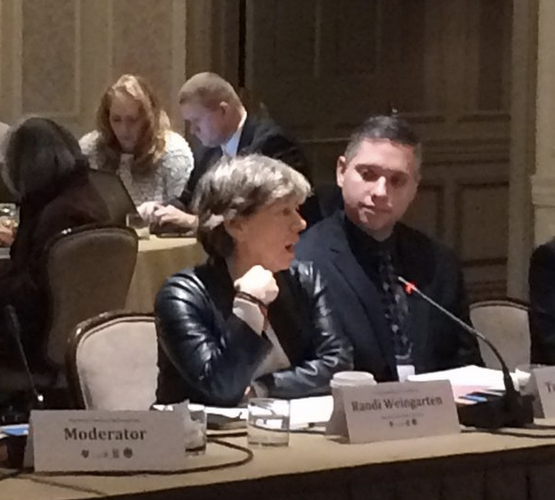A conversation about a path forward at #TFA25

Politics and religion have long been known for their potential to turn a conversation into a conflagration. In the last decade, education joined that short list of touchy issues. That’s no wonder, since many self-described “reformers” frame the debate around false dichotomies, such as their claim that one can’t be both pro-child and pro-teacher, or that their camp cares more about children or has a greater sense of urgency than “regular” classroom teachers and the unions that represent them. While I completely reject those propositions, it doesn’t mean that our differences should stop our discourse with each other — quite the contrary, because we can’t solve problems in education or make progress without finding common ground.
And that is what happened last weekend. Thirteen thousand people converged on Washington, D.C., for Teach for America’s 25th anniversary. Even though I have been critical of TFA, I was invited to speak about how to address both education and poverty, along with Howard Fuller, an education activist who supports education vouchers and other forms of privatization. Cecilia Munoz, the White House domestic policy advisor, moderated the discussion and kept it constructive.
I’m pretty sure a fair number of people attended the packed session to see if the discussion between two people who don’t see eye to eye — either physically (he is much taller) or ideologically (in many respects) — would descend into Fight Club.
Fuller didn’t win me over to his side, and I’m sure I didn’t convert him, either. The private school vouchers he introduced as superintendent of Milwaukee Public Schools a quarter century ago have not produced superior academic results for students who receive them, nor have they spurred public schools to improve in order to compete. Sadly, Milwaukee’s public and voucher schools perform at levels comparable to those in rural Alabama and Mississippi. And yet Fuller continues to advocate nationally for choice and privatization. But that wasn’t the point.
My purpose was not to debate Fuller; it was to have a conversation about a path forward, to end the ridiculous debate in reform circles that poverty and greater economic issues don’t matter, and to debunk the notion that individual teachers can do it all.
I caught some flack on Twitter and Facebook for even attending a TFA event. The AFT and TFA disagree on a number of fundamental issues regarding education. I believe that teacher preparation should reflect the complexity and importance of this work, and that a crash course simply doesn’t cut it — it’s not fair to corps members or their students. Further, I think that TFA’s model of inadequately prepared teachers and high turnover deprofessionalizes teaching by design. And it’s dead wrong when districts use austerity as the excuse to hire TFA recruits as replacements for experienced teachers.
I believe that teacher preparation should reflect the complexity and importance of this work, and that a crash course simply doesn’t cut it — it’s not fair to corps members or their students.
Regardless of what one thinks about TFA as an institution, I believe it’s a A conversation about a path forward at #TFA25 — Medium:
